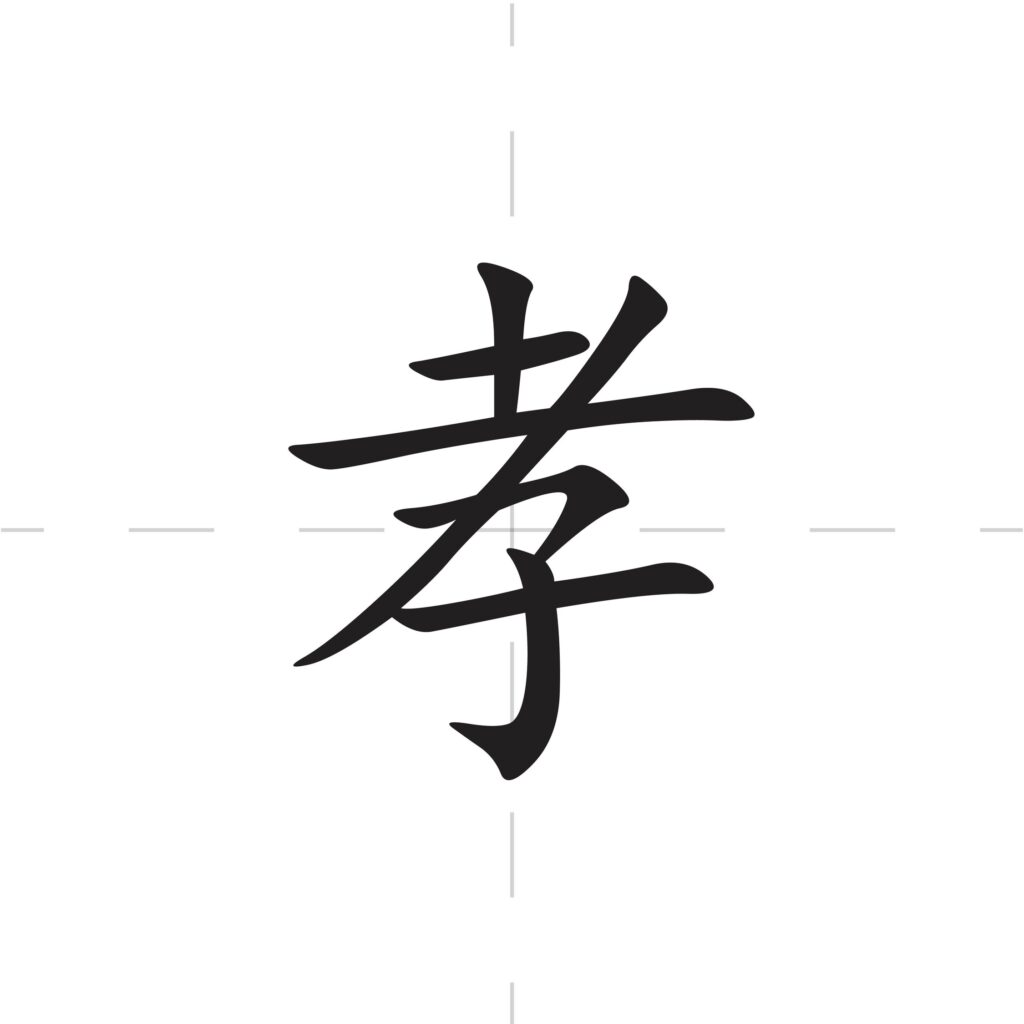In Chinese culture, one of the most important virtues is filial piety. There is a saying ”百善孝为先“ which translates to “Out of a hundred virtues, filial piety comes first”. What is filial piety, also known as ”孝道“ (Xiào dào)?
Filial Piety
Meaning of Filial Piety
Filial piety is the idea that children are subordinate to their parents and should give them their utmost obedience and respect. This goes beyond the Western concept of respect for parents. Under the Chinese concept, one is eternally indebted to their parents. This is justified by the fact that our parents gave us life and painstakingly raised us. It is hence a child’s duty to repay their parents by providing for them and making them happy.
The idea of filial piety is strongly embedded in the psyche of Chinese people. One of the worst labels for one to be given seems to be “不孝子/女” (Bù xiàozǐ/nǚ) which means unfilial son/daughter. When I was a child, I read folklores related to filial piety which highlighted the consequences of not being filial, namely that you may suffer the same fate by your own children when you are old.
Origin of filial piety
It is derived from Confucianism, a philosophy that has been in China for over 2,000 years. It is a school of thought for understanding the universe and social organisation.
There are hierarchical structures present in Confucianism, such the subordination of females to males. Filial piety places the children below their parents. It is a way of organising the family and the entire society. It was understood that only a filial son could be a good subject of the emperor.
Filial piety in society
The narrative of filial piety runs in our society (where three-quarters are ethnic Chinese) not only through culture but also national policies. Under the Maintenance of Parents Act, Singaporeans over 60 can claim maintenance from their children if they are unable to support themselves.
While the preservation of traditional values in a rapidly modernising society is definitely a good move, it should be noted how only selected values are highlighted while others like gender inequality which do not serve a purpose in nation building are ignored. The reinforcement of family values is strategically in the interest of economic growth.
Given that filial piety has a strong place in our society, we ought to examine what the downsides of it are. This article is an attempt to examine the problems of filial piety, specifically its implication on the freedom of young people.
Problems of Filial Piety
1) Control over children’s lives
Due to the narrative of filial piety which gives parents much power over their children, some parents mistakenly think that their children belong to them. This leads them to exert control over their children’s lives from their study, work to marital choices.
They may dictate these choices according to what the societal standard is or what their personal preferences are. This is especially if the parents’ life choices were also dictated by their parents.
Since their true desires were suppressed, they then try to live their dreams through their children. I personally know more than a few peers whose life choices are influenced by their parents to a large extent. For example, they are persuaded by their parents to choose a prestigious major in university even if it is not something that they are very interested in.
Why do children follow their parents’ wishes even though it is not what they truly want? Their compliance may come from the fear of conflict with their parents or letting down their parents. If not, it may come from an innate desire to have their worth acknowledged. The latter is probably common in an Asian upbringing where self-worth is not commonly affirmed.
In the Confucian view, personal achievement is tied to family honour. How one fares in life either brings shame or honour to the family. The saying “望子成龙,望女成凤“ (Wish for son to become a dragon and daughter to become a phoenix) illustrates the high expectations of Chinese parents for their children to be outstanding. As such, this is a strong motivating factor for children to try to measure up to societal standards instead of just being who they are.
Unfortunately, many people live lives that their parents want them to live until they decide that they have had enough. By then, they might have already missed out the opportune years in their lives to pursue what they truly want for themselves.
Own Pathway to Follow
Though children might have come into existence in this world through their parents, it does not make them a property of their parents. Parents do not have a right to dictate their children’s life choices even if they have lived longer and accumulated more life experiences. This is because children have their own pathway to follow. In fact, every individual has their unique pathway to follow since we are all made up differently.
Another reason why parents should not control their children’s lives is that it does more harm than good to their children. Children may have to go through many detours or long routes but these are needed for them to find out what makes them truly fulfilled. By deciding what is best for their lives, it denies them the opportunity for exploration and growth.
Lastly, there are intergenerational consequences. While giving in to the parents’ wishes may make them happy and help to maintain harmony in the short term, it is a win-lose situation as it is at the expense of the child’s happiness. In the long term, it becomes a lose-lose situation. When one does not follow their own pathway, they will not feel fulfilled. There may be a build-up of hidden resentment towards their parents which strains the relationship between the both. They are also likely to end up imposing their unlived dreams on their future children, passing it down generations. No one ends up happy.
2) Cover-up for Narcissism
The other problem of filial piety is that it easily becomes a cover-up for narcissism which is defined by excessive self-concern and an inability to empathise with others. As there are narcissistic people, there are also narcissistic parents.
In narcissistic parents, what appears to be concern for their children may actually be concern about their own interests. They use their children as a means to fulfil their own needs or wants. For example, there is a saying “养儿防老” which means to raise children as a safeguard for old age. Parents who choose to have children mainly because of that reason may make unreasonable demands of their children to provide for them.
Narcissistic parents also tend to view their children as an extension of themselves instead of the separate individual whom they are. They may ride on their children’s achievements for their own glory but take little responsibility for failures. This is pertinent in a culture where “Face” is valued. These parents try to make their children into who they want them to be rather than nurture them in their own being.
Children who disobey their narcissistic parents to pursue what they want for themselves may be labelled selfish. Guilt-tripping is a common tactic used by narcissists to manipulate others into following their wishes.
What Love is Not
The thing is this: Love is NOT narcissism. Love is unconditional acceptance of someone for who they are. That means not trying to change anything to suit one’s own liking.
Sadly, recognising narcissistic parental abuse is difficult. These behaviours are often under the pretence of “tough love” where parents act harshly on their children, claiming they know better and want what is best for them. This is known to be the typical parenting style of Asian parents, especially “Tiger moms”. On the surface, it is hard to tell whether it is tough love or abuse because it looks similar. The answer lies in the intention. Does it come from a place of unconditional acceptance/giving or not?
From my observations, outsiders under the same culture help to cover up such behaviours by emphasising the nobility of the parents’ sacrifice and telling the young how much their parents love them deep down no matter how they act outside. Calling it out as abuse is a morally difficult thing to do as it would be deemed “unfilial”. The idea of abuse largely remains as one of physical neglect and violence.
3) Poses Moral Dilemma
Lastly, the narrative of filial piety poses a moral dilemma of having to choose between going against a virtue and living a life untrue to oneself. Certainly, few of us would want to be called a bad child for going against our parents’ wishes. By casting it as a problem of traditional values, it also encourages an attitude of resignation about having any freedom of choice. I often hear this being expressed in laments about how this is the way things are in Asian culture.
One of the roles of culture is to set moral guidelines to abide by. But in the end, it should still be up to an individual to decide what is moral or not. What is culture? Culture is quite simply a narrative that has been passed down from generation to generation. Of course, the members of each generation have to decide whether something is worth passing down or not.
Cultural is Not Absolute
If being free to pursue a life that you want sounds like a Western value, it is actually closer to Eastern thought than you think. In neo-Confucianism, there is a concept known as “理” (Lǐ, but not “礼” for propriety) which loosely translates to “Principle” or “Pattern”. Just like every piece of jade has unique grains in it, everyone has a unique pattern in them. Each individual has their own personality, strengths, weaknesses, likes and dislikes. These individual differences can come together to produce harmony. This does not require conformity as sameness would not fit into the natural pattern of the whole.
This aspect of Confucianism is coherent with the other Chinese philosophy of Taoism. Tao or Dao (“道”) basically refers to the course of nature. Under the Taoist view, it is thought that all things automatically obey the law of nature. Non-interference is the most ideal. In the case of raising children, parents should let them grow naturally into who they are meant to be and exert a minimal amount of control where necessary. One can try to go against the flow of nature but it will be met with unnecessary resistance and suffering.
In light of these, we see that the standards set by culture are not absolute. There are traditional values that are in favour of one following their own pathway but not given much attention. As mentioned before, there are specific reasons behind that.
Instead of letting the question of life choices be answered by something external like culture, it is more empowering to seek these answers within oneself. One should take up the responsibility of creating their own pathway which aligns with who they truly are rather than leave it up to someone else to decide.
Conclusion
Ultimately, there is value to preserving the virtue of filial piety. For instance, it upholds the importance of gratitude. However, we have to be careful of the problems that can come from it as well. Both sides have a part to play in resolving these problems. Parents have to learn to let go of the urge to control and to see children as beings with their own individuality. On the other hand, children have to learn to find enough courage to pursue a life true to themselves instead of giving in for the sake of short-lived harmony. When they can do that for themselves, they can give back to their parents from a place of true joy and not obligation. That is what I believe love is.



One Response